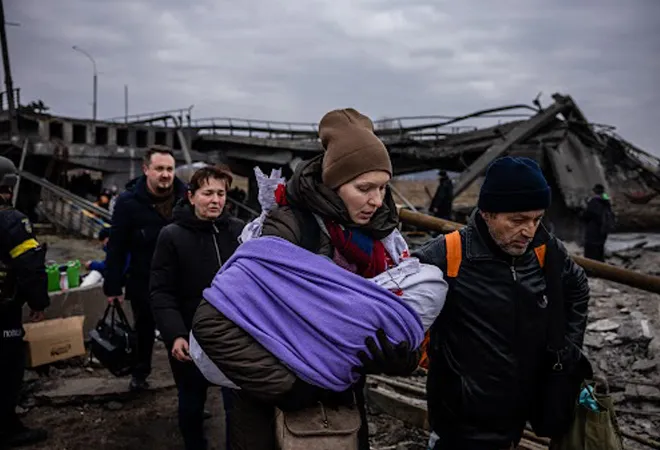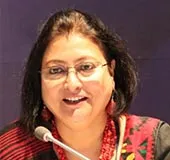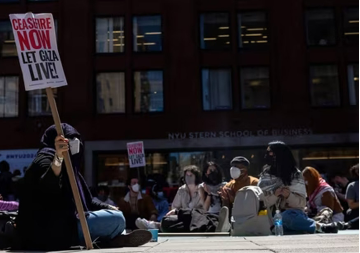
This brief is a part of The Ukraine Crisis: Cause and Course of the Conflict.
While the 1951 Refugee Convention has just completed its 70th year of existence, conceived as a consequence of the Second World War, Europe is again facing a severe refugee crisis following Russia’s invasion of Ukraine on 24 February. Russia’s efforts to take over Ukraine’s major cities to overthrow the country’s democratically elected regime, have resulted in one of the largest refugee spillovers of the present decade. Russian President Vladimir Putin’s desire to remove the NATO’s presence—be it in the form of military infrastructure or military forces in close proximity to Russian borders—led him to launch one of the biggest military interventions ever to have taken place on European soil since the conclusion of the Second World War.
About 660,000 refugees have already made their way into Ukraine’s neighbouring states since last week, with many other Ukrainian nationals still continuing to seek asylum in the Central European states of Czechia, Romania, Hungary, Moldova, Poland, and Slovakia.
Poland as a safe land
Reports suggest that Poland has witnessed the highest number of Ukrainian refugee arrivals, in comparison to its other European neighbours. The people of Ukraine have flocked to Poland via eight border points—amongst which, primary border points such as Korchova- Krakivets and Medyka—have witnessed a large volume of women and child refugees.
Polish citizens and organisations such as the Red Cross have been deeply involved in efforts directed towards the provision of relief materials in the form of warm clothes, blankets, and water at Red Cross stations situated near the Ukraine-Poland border.
Polish authorities have relaxed border restrictions, and have also exempted the fleeing Ukrainians from showing their COVID-19 test reports. Those without any valid documents have also been granted safe passage, given the severity of the situation. However, this move on part of the Polish government has raised serious health concerns since Ukraine recently experienced a surge in COVID cases in the month of February, where data itself has gone on to show that 60 percent of the COVID-19 tests that were conducted in the country, came out positive.
Polish citizens and organisations such as the Red Cross have been deeply involved in efforts directed towards the provision of relief materials in the form of warm clothes, blankets, and water at Red Cross stations situated near the Ukraine-Poland border. The Polish Red Cross has also been engaging in fund-raising campaigns to raise funds and assist the Ukrainian refugees.
Romania’s silent stance
Since last week, data put forward by the Romanian government suggests that 67,000 Ukrainians fled to Romania, seeking shelter in the wake of the recent Russian invasion. The Siret border crossing, for instance, witnessed a large number of women and children refugees. The Ukrainian government’s move towards conscripting males aged 18-60 following a Presidential decree, has prevented a large section of Ukrainian male refugees from crossing over with their families, leaving women and children to fend for themselves.
Though the Romanian government has shown solidarity with the Ukrainian government by guaranteeing help in the form of cyber security backing, it has not been very active in providing for the accommodation of the country’s refugees. Rather, the Romanian citizenry have engaged in efforts to accommodate their immediate neighbours by means of social media. Citizens have formed a Facebook group called ‘Uniti Pentru Ucraina’ (or United for Ukraine) and it already has more than 242,000 members comprising of volunteers, donors, and Ukrainians on the run, in search of help.
Slovaks open their homes
The Slovakia–Ukraine border (97 kilometres) is one of the shortest in compare to the Ukraine–Poland border (535 kilometres) and Ukraine–Romania (600 kilometre). Nonetheless, it has still witnessed huge refugee flows from Ukraine as a visa-free regime exists between Slovakia and Ukraine which enables one to reside in the country for a period of up to 90 days. Data indicates that around 26,000 Ukrainian citizens haves fled to Slovakia since 24 February.
The Ukrainian government’s move towards conscripting males aged 18-60 following a Presidential decree, has prevented a large section of Ukrainian male refugees from crossing over with their families, leaving women and children to fend for themselves.
Only Ukrainian people with valid biometric passports can enter Slovakia. The Slovakian Ministry of Interior has permitted Ukrainian nationals without biometric passports at the entry point, following procedures of individual assessments along with their personal documents, such as the national Ukrainian passport, for instance. Since the border points are primarily being crossed by women, young children, and babies, in some cases these minors do not have valid documents like birth certificates and vaccination certificates.
Slovak authorities have welcomed Ukrainian refugees and offered a grant of 200 euros per month for all those Slovak homes and institutions that host a Ukrainian adult. Further, Slovakia’s Finance Ministry has also provided a grant of 100 Euros per month for accommodating child refugees. While every border crossing between Slovakia and Ukraine remains open, the Čierna nad Tisou railway crossing remains shut. This has mounted pressure on all the vehicle border crossings between the two nations. Further, Ukraine has closed its airspace for all civilians since the 24th of February, which has increased the pressure on the land-border crossings.
Hungary’s selective anti-migrant rhetoric
While Prime Minister Viktor Orbán has more often than not maintained a xenophobic stance against refugees from the Middle East, Hungary has opened its doors for all those in search of asylum from Ukraine. The European Parliament has held discussions in the past with regard to taking disciplinary action against Hungary’s anti-migrant policy, given the country’s tendency to be hostile and discriminate against granting asylum to refugees from Afghanistan and Syria. The dynamics seemed to have changed in the case of Ukrainian refugees, seeing how they are welcomed in the country.
Slovak authorities have welcomed Ukrainian refugees and offered a grant of 200 euros per month for all those Slovak homes and institutions that host a Ukrainian adult.
Indeed, it is noteworthy that Hungary has refrained from sending any form of military assistance to Ukraine, but remains open to helping out Ukrainian refugees. Hungarian authorities have relaxed rigid immigration rules and granted safe passage to Ukrainians with or without documents, such as vaccination certificates or visas. Major Hungary-Ukraine border crossings such as Lónya-Harangláb and Barabás-Kaszony, for instance, were opened up for Ukrainian refugees.
In general, the Global North has a tendency to resettle less number of refugees in its domain, rather donate to nations in the Global South for hosting efforts. In the context of the Russia–Ukraine crisis, the trend seems to have reversed—with the prosperous nations in the Global North opening their doors to the fleeing Ukrainians instead.
Moldova’s gain
Moldova has taken in 88,000 Ukrainians at the least, becoming the third-highest in terms of Ukrainian refugee intakes after Poland and Hungary. Moldova suffers from an acute labour shortage and its authorities have gone on to offer facilities such as schooling and healthcare for Ukrainian refugees, so as to boost its labour pool. Moldova has opened up its schools for Ukrainian teachers, offered them jobs as restaurant staff, and so on.
Though Moldova remains open to hosting a large section of refugee population from Ukraine, Ukrainians have not been very open to settling in Moldova as they are apprehensive that the country could be invaded by the Russians next.
Belarus opens for Russian troops instead
Belarus has witnessed a small influx of Ukrainian refugees as well. It is true on the other hand that Belarus has been sending its military troops to help the Russians in carrying out their invasion against Ukraine. Belarus’ support towards Russia’s war efforts have been widely condemned by the international community including the European Union (EU), the United States (US), and Asian powers such as Japan deciding to enforce economic sanctions against the top brass in Belarus. The Belarusian Prime Minister Lukashenko had expressed his willingness to support Russia in invading Ukraine, if required. In fact, a primary reason as to why Poland is hosting the largest Ukrainian refugee population at present is also because Polish rights activists claim that the spike in Ukrainian refugees is due to a push by the Russian ally.
The Belarusian Prime Minister Lukashenko had expressed his willingness to support Russia in invading Ukraine, if required.
Czechia’s support
Despite strict immigration rules and regulations, and other efforts on part of the Czech Republic to prevent any possible refugee intakes, the country has opened its borders to Ukrainian citizens. Having done away with obligations such as presenting vaccination certificates, negative COVID-19 tests, conducting RT-PCR tests within Czech territory, and so on for incoming Ukrainian nationals, it is speculated that the Czech Republic shall witness a surge in COVID-19 cases, along with an additional strain upon its healthcare infrastructure, resulting from a large Ukrainian refugee inflow. While several Ukrainian refugee arrivals were on their own, several others arrived via trains or with the help of volunteers appointed by the Czech government, via Ukraine’s neighbouring states like Slovakia and Poland. Despite not being border-sharing states, border crossings at Czechia have been experiencing long lines and heavy traffic, as if it were one of Ukraine’s immediate neighbours.
Conclusion: ‘Europeanness’ in refugee intake
There is no doubt that the Russian invasion of Ukraine has created shockwaves worldwide, with the impact of the crisis already being strongly felt in Central Europe. The response of certain EU countries towards Ukrainian refugees, which also happen to be Ukraine’s neighbouring states—namely, Slovakia, Poland, Romania, Belarus, Hungary, Moldova, and the Czech Republic, have raised questions of the double standards in accepting refugees. Over time, refugee crises have raised questions on factors such as national identity, equality of opportunity, and the universalisation of human rights. The concept of ‘othering’ being one where groups or individuals are discriminated on grounds of not being able to fit in, as per the norms of a certain social group, remains quite pronounced in the case of non-European refugees, seeking asylum in Europe.
While several Ukrainian refugee arrivals were on their own, several others arrived via trains or with the help of volunteers appointed by the Czech government, via Ukraine’s neighbouring states like Slovakia and Poland.
Ukraine’s neighbouring states maintain a hard-line stance against refugees, in particular, refugees from the Middle East and Africa, and have resorted to employing hostile means such as pushbacks to avoid accommodating this category. A Eurocentric bias can, thus, be seen if one compares the attitude on part of the European countries when it comes to refugee intakes between European refugees and non-European refugees from the Global South—especially refugees like Afghans, Syrians, and Palestinians, in this context. This has brought forth concerns pertaining to how the concept of ‘Europeanness’ has come to be constructed in a strong and rigid manner. Also a question that remains pertinent here is how far the existing international legal ecosystem can address the Global South’s concerns without having a pluriversal approach to the contemporary refugee issue, moving beyond the Euro-centric 1951 Convention.
Prarthana Sen is intern at ORF
The views expressed above belong to the author(s). ORF research and analyses now available on Telegram! Click here to access our curated content — blogs, longforms and interviews.




 PREV
PREV


